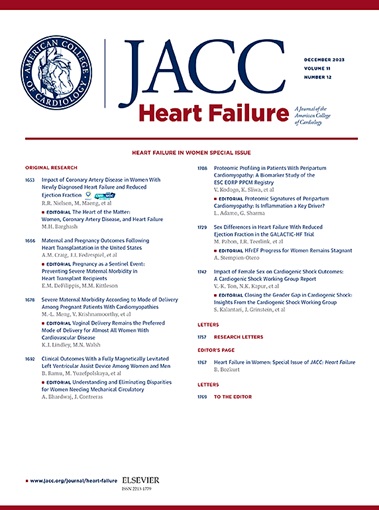最不重要的堪萨斯城心肌病问卷在心力衰竭严重程度范围内的变化
IF 11.8
1区 医学
Q1 CARDIAC & CARDIOVASCULAR SYSTEMS
引用次数: 0
摘要
虽然堪萨斯城心肌病问卷(KCCQ)评估了心力衰竭患者的重要结局,但KCCQ的5点变化是否代表了非常差的个体患者与非常好的心衰严重程度的最小临床重要差异(MCID)尚不清楚。目的本研究旨在定义kccq -总体总结评分(OSS)和kccq -临床总结评分(CSS)在基线健康状况范围内的mcid。方法从14家诊所招募射血分数≤40%的心力衰竭门诊患者,分别在基线和6±2周后完成kccq,并使用15分Likert量表评估他们感知到的健康状况变化。线性回归估计了在基线KCCQ分数范围内小但重要的变化的MCIDs。结果467名参与者(年龄61±13岁,75%为男性,左室射血分数25%±8%,基线KCCQ-OSS 61.0±23.7)中,28人报告中度/重度恶化,28人报告轻微但重要的恶化,293人报告无变化,35人报告轻微但重要的改善,83人报告中度/重度改善。虽然改善的MCIDs略小,但基线评分较高(基线KCCQ为20时为6.0 [95% CI: 3.8-8.3], 95时为2.1 [95% CI:−0.0 - 4.5];P趋势= 0.003),恶化的MCIDs不变(P = 0.87)。KCCQ-OSS改善或恶化的总体MCIDs为3.9 (95% CI: 2.7-5.4), KCCQ-CSS的结果相似。结论无论患者的基线健康状况如何,KCCQ评分的5分差异都代表着重要的临床变化,可用于临床试验和临床实践。本文章由计算机程序翻译,如有差异,请以英文原文为准。
Minimally Important Kansas City Cardiomyopathy Questionnaire Changes Across the Spectrum of Heart Failure Severity
Background
Although the Kansas City Cardiomyopathy Questionnaire (KCCQ) assesses important outcomes for patients with heart failure, whether a 5-point change in KCCQ represents a minimal clinically important difference (MCID) in an individual patient with very poor, as compared with very good, heart failure severity is unknown.
Objectives
This study aims to define MCIDs for the KCCQ–Overall Summary Score (OSS) and KCCQ–Clinical Summary Score (CSS) across the range of baseline health status.
Methods
Outpatients with heart failure with ejection fractions ≤40% recruited from 14 clinics completed KCCQs at baseline and 6 ± 2 weeks later, along with a 15-point Likert scale assessing their perceived changes in health status. Linear regression estimated MCIDs for small but important changes across the range of baseline KCCQ scores.
Results
Among 467 participants (aged 61 ± 13 years, 75% men, left ventricular ejection fraction 25% ± 8%, baseline KCCQ-OSS 61.0 ± 23.7), 28 reported moderate/large deteriorations, 28 small but important deteriorations, 293 no change, 35 small but important improvements, and 83 moderate/large improvements. Although MCIDs for improvement were slightly smaller, with higher baseline scores (6.0 [95% CI: 3.8-8.3] for a baseline KCCQ of 20 vs 2.1 [95% CI: −0.0 to 4.5] for 95; P-trend = 0.003), MCIDs for deterioration were constant (P = 0.87). The overall KCCQ-OSS MCIDs for improvement or deterioration was 3.9 (95% CI: 2.7-5.4), with similar results for the KCCQ-CSS.
Conclusions
A 5-point difference in KCCQ scores represents an important clinical change for patients, regardless of their baseline health status, and can be applied to both clinical trials and clinical practice.
求助全文
通过发布文献求助,成功后即可免费获取论文全文。
去求助
来源期刊

JACC. Heart failure
CARDIAC & CARDIOVASCULAR SYSTEMS-
CiteScore
21.20
自引率
2.30%
发文量
164
期刊介绍:
JACC: Heart Failure publishes crucial findings on the pathophysiology, diagnosis, treatment, and care of heart failure patients. The goal is to enhance understanding through timely scientific communication on disease, clinical trials, outcomes, and therapeutic advances. The Journal fosters interdisciplinary connections with neuroscience, pulmonary medicine, nephrology, electrophysiology, and surgery related to heart failure. It also covers articles on pharmacogenetics, biomarkers, and metabolomics.
 求助内容:
求助内容: 应助结果提醒方式:
应助结果提醒方式:


